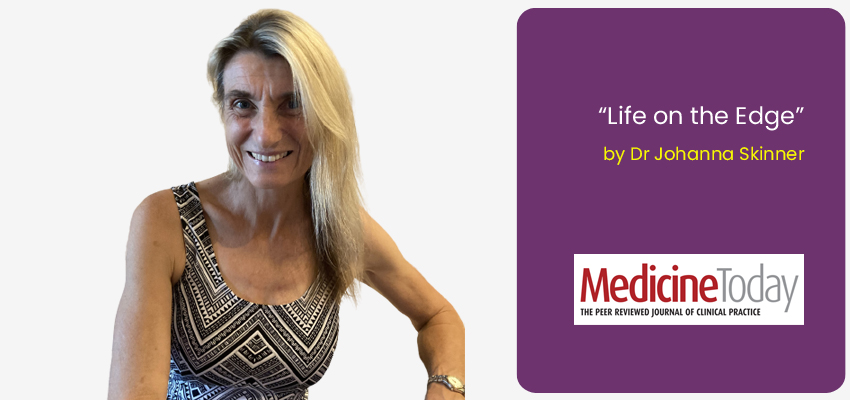Dr Johanna Skinner is a general practitioner who has worked in urban, regional and remote Australia as well as in Cork, Ireland for a year. When she is not practising medicine, she enjoys distance running and writing both non-fiction and fiction. The non-fiction is often harder to believe.
One of the raw realities of working in general practice is that at some point we will be called upon to navigate the final days with patients who have a terminal illness. It is part of being a family doctor. We get to know not only our individual patients intimately but also their extended families, often providing care through different life stages. Often, we are the health provider who informs a patient when they have a terminal diagnosis.
While challenging, particularly when we know our patients well, palliative care is enormously rewarding. It is a time when we often pause and learn things not just about the patient and their family, but about ourselves. In these frenzied times where being busy is regarded as a badge of honour, it is a wonderful privilege to pause and to be able to spend quality time with someone as they share their wisdom during their final weeks.
Dr Skinner finds herself reflecting on her own life and what is important after the death of one of her regular patients, Maude.
“Life on the Edge” Published in Medicine Today – July 2022
By Dr Johanna Skinner
It is late Friday afternoon, and my next patient is Lorna. It makes me uneasy. She usually comes every fortnight on a Tuesday morning, despite my reassurance that once a month is enough. I started seeing her years ago, remember diagnosing her diabetes, suggesting some lifestyle changes which she resisted. From early on she made it clear my role was to prescribe her medications, check her blood pressure, listen to her grumbling dissatisfaction with life.
Out in the waiting room, I call her name, prepare to help her stand when the elderly gentleman beside her hooks his arm beneath hers and helps her up. I realise this must be Al, her husband whom I have never met, only heard about. She complains about his poor tea-making, his careless time management.
She makes her way slowly down the corridor with Al’s gentle encouragement. He eases her into the chair, and it sighs under her bulk.
‘What can I do for you today, Lorna?’
I am careful to keep my voice light.
‘It’s my belly. It hurts here.’
She prods her substantial abdomen.
Al leans forward. ‘Lorna didn’t eat her shepherd’s pie last night. It’s her favourite.’
The truth of his statement settles in the room. Lorna has always enjoyed her meals, eats at the exact same times each day.
With Al’s help, I heave Lorna onto the examination table. Palpating her abdomen, I feel a lumpy area just under her ribcage. Apprehension expands inside me.
‘How do you feel about driving to the city for an ultrasound this evening?’
It is peak traffic and I know the two of them would normally be settled in front of the early news with dinner. Their daily routine is imprinted in my brain. Lorna keeps me well informed.
I ring the hospital to ensure she is seen right away, hand Al the form. Two hours later, the radiologist calls, gently informs me that Lorna has gallbladder cancer. Cold fingers squeeze my heart. I realise how fond I am of her, worry how she will cope with the diagnosis. I ring, relieved when Al responds, arrange follow up.
They arrive early, make the shuffling trek to my office. After Lorna sags into the chair, I hold both her hands in mine, wish I could soften the news. ‘I’m sorry, Lorna. It’s a cancer of the gallbladder.’
Al looks over, his eyes filled with understanding. I turn away, my own eyes moist. Lorna stays very calm, still. Gently, I explain that her options may be limited, that I would arrange a surgical opinion.
‘Thank you, love.’
This is the first time Lorna has had so little to say. I suppress the urge to fill the quiet with words, feel the weight of the diagnosis heavy between us. I encourage her to contact me with any questions before sending them out with a referral.
It turns out her cancer has already metastasised, the treatment palliative. Al rings me.
‘We appreciate everything you’ve done. I wonder if you could come and see Lorna at home?’
Al chats for a while and I learn that Lorna has a long history of anxiety that started after the birth of her sons over fifty years ago. Over the years, her world has shrunk to small manageable segments. Even a trip to the shops was organised to coincide with the least busy times. Al and her sons rearranged their own lives around her immobilizing fear, her increasingly rigid routines. She absorbed herself in quilting, won prizes at the EKKA, Brisbane’s annual show but never managed to attend to receive her awards. Friendships fell away after too many apologies for not attending catch ups and celebrations. Even family functions were too overwhelming. It occurs to me that Lorna’s avoidance of the world and its uncertainties is not so dissimilar to me crowding my days to overflowing, pleading work commitments when invited to pause, just be and enjoy life’s little details.
Their home is a sprawling old Queenslander, paint blistered from too many summers, the garden overgrown with long grass, the stairs precarious. Al beams at the door, invites me in. Lorna sits in the sunroom a half-finished quilt in her lap. She smiles, beckons for me to join her.
‘Would you like a cuppa?’
Al is sent to make the tea. I start to open my bag, prepare to examine her. Her hand reaches out, stops me. ‘It doesn’t matter anymore, love. I’m just planning to finish this quilt for my first great grandchild. I want to get a few things in order.’
I force myself to sit with my own discomfort at not doing something.
The tea is a perfect brew. Lorna is relaxed, happy. We chat, sip tea and I learn her grandson is planning to visit with his wife and baby.
I look forward to these weekly visits, learn to ignore the urgency in my head and just listen to Lorna chat. I feel devastated when she dies just over two months later. After the funeral, Al drops by to tell me that in the weeks before she died, the house was full of family, neighbours, friends they had not seen for decades.
Lorna’s easy acceptance of her diagnosis gave me pause for thought, reminded me how our lives can be derailed in a moment. It was only when Lorna was faced with the worst-case scenario that she finally let go of her debilitating worry, enjoyed the messy reality and uncertainty of each day as it unfolded.
I find myself at the end of another Friday and reflect on Lorna’s life, largely unlived, remember her final, joyful weeks.
My receptionist pops in. ‘Can you squeeze in a couple more?’
‘Sorry, I have to go.’
I ignore the loud whisper of guilt, the incessant clamour of to dos that taunt me. I exhale and log off ready to immerse myself in the delightful chaos that awaits me at home.


